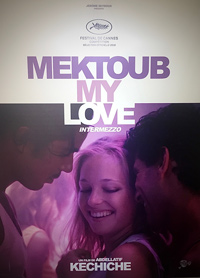Dancing…Yeah: Kechiche Spins Like a Record Round in Vacuous Sequel

The French-Tunisian director who won the 2013 Palme d’Or for Blue is the Warmest Color continues to solidify his reputation as a voyeur auteur with the second chapter (presumably, based on the parenthetical chapter title) in his perverted, vapid coming-of-age trilogy with Mektoub, My Love: Intermezzo. To be quite honest, this three and a half-hour marathon, which really only consists of two lengthy, never-ending sequences, tends to feel a bit more dynamic than 2017’s Mektoub, My Love: Canto Uno, if only because it’s a trance-inducing dance epic (if you call dancing an act of standing in one spot and jiggling fleshy attributes) and we aren’t forced to consume the formidably vacuous chatter of its main characters. Supposedly, Abdellatif Kechiche’s two films are still about a young man named Amin as he enters adulthood and pursues photography in September, 1994. Such are the gossamer strands of a plot semblance which project us into a time and place which isn’t so much glorifying hedonism but flaccid narrative apathy.
Amin (Shaïn Boumedine) continues to desire to be a photographer as the summer season begins to end in Sète. Complicated attractions to the visiting Charlotte (Alexia Chardard) and local Ophélie (Ophélie Bau) are put on brief hiatus as his friends and relatives first visit the beach (where they pick up a new nymphette from Paris) and then all go out dancing at a club. Three-and-a-half-hours later, the film ends.
Yes, so, there’s a fourteen-minute or so cunnilingus scene which takes place in the toilets of the club we’ve been doomed to attend along with these dancing queens. Ophélie Bau, whose character is pregnant and will likely provide another pièce de résistance abortion sequence if a third film is made, suffers the indignity of the unsimulated and unnecessary sequence. Strangely, Mektoub (which is a term finally alluded to diegetically, an Arab word referring to predestination) actually seems to be more about Ophelia than Amin, as he is merely one admirer of hers and she is the only one allowed any kind of dramatic catalyst to further the narrative.
As an exercise in immersion, there is something to be said for this sort of provocation—but Gaspar Noé succeeded in only a third of the running time with something less misogynistic and elaborately choreographed with Climax (a film which features a track also used here in the nightmarishly paced club sequence). If only there was some point of interest for us to cling to, as the film seems merely a titillating safe space for leering heterosexual men content with watching scantily clad young women vibrate themselves against dance poles (which it appears none of the other attendees at this club desire to try, for some reason). We’re left to cling to the barebones of the dialogue for some meaningful subtext.
Newcomer Marie, who doesn’t look like Romy Schneider or Emmanuelle Béart (both whom she’s compared to), is reading a text on philosophical myths on the beach, which creates some minor chatter. But mostly, this is a film where its trio of men play off their dynamics with the women introduced in the last chapter, thankfully with Alexia Chardard’s gratingly passive role as the vacationer from Nice cut down considerably in this installment. On a positive note, Hafsia Herzi is still along for the ride, who, despite looking somewhat crazed, provides a sobering element of grace and maturity.
References to dance films are likely to abound, particularly 1969’s They Shoot Horses, Don’t They?, the Jane Fonda classic about depression era dance contests where contestants literally danced themselves to death in a desperate attempt to win a little cash. Kechiche’s film refracts this desperation onto its audience members, especially those who aren’t heterosexual men, to endure a film experience which feels akin to a hazing ritual, an undertaking which may conjure praise from some just for completing it. While Mektoub, My Love: Intermezzo is arguably praiseworthy, one sees ideas and can appreciate the sheer, deliberate audacity at his attempt to deliver unprecedented cinematic experiences (the dance club cinematography from Marco Graziaplena, when it isn’t obsessed with asses, is intoxicating). If Canto Uno felt like a descendent of Férid Boughedir’s A Summer in La Goulette (1996), Intermezzo, while featuring the same characters, is a different beast, exuding a distinctive energy entirely.
Unfortunately, the queer good will bestowed on his unabashedly lesbian Blue is the Warmest Color evaporates in the face of his gratuity here (not to mention a blatant lack of gender parity when it comes to genitalia on the screen). Maybe Mektoub, My Love: Intermezzo has nothing to say. But everyone will likely have something to say about it.
Reviewed on May 23rd at the 2019 Cannes Film Festival – Main Competition. 208 Minutes
★½/☆☆☆☆☆


